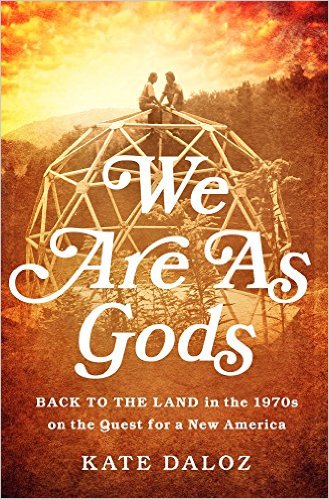
One of most telling features of Kate Daloz’s book, We Are as Gods, about the Back to the Land movement of the 1970s, is its ability to make the reader question what this sort of movement would feel like if reenacted today. The book provides a lot of research on what it was like to be a part of this movement, which allows the reader to relate to the characters, weaving both personal accounts – pulled from interviews with Daloz’s own parents, who lived on a Back to the Land commune, Myrtle Hill Farm – and evidence fathered from intensive studies on what the movement was like. The story is vivid as it is told through Daloz, who spent her childhood on the farm.
The attention to detail that Daloz exhibits throughout the book reveals itself through this personal gaze and we learn that the movement revolved around something much more instinctual for the author – family, “For Lorraine, the purpose of communal life meant not just badly needed help with childcare but also a chance to reinforce the whole premise of a family” (18). We Are as Gods becomes one family’s recount of what it was like to live on a commune and reinvent new ways to live against the backdrop of a hegemonic United States.
Questions that come to mind as a reader of color was how the Back to the Land movement addressed the full concerns of a capitalistic society. How was Daloz going to talk about the mimicry in what was being done by buying a plot of land a starting anew to what it was like for New England settlers when they first arrived in the thirteen colonies? Whose land is it that’s being returned to? When were American people there in the first place and what was the context? In this sort of assessment, we realize that Daloz falls into white author’s dilemma of characterizing her own experiences without addressing the way it impacted others. Moreover, the book did not clearly address the lineage and history of the capitalistic society the characters were trying to escape from.
The entire time I read the book, written with splendid attention to detail and historical reenactment, my guise focused on the stories of characters that were not included. It draws attention to whether writers should write of what they know without addressing the other.
Although readers of different backgrounds may see the dilemma in forgetting to address the significance and privilege of “returning to the land,” Daloz writes a stunning book writers of non-fiction wish to emulate. The braided style of historical information and personal narrative frames the story of the back to the land movement concisely, so enticing that readers have trouble falling out of the illusory world created. Readers will nonetheless be left with questions of what it would feel like to live in this sort of world against the backdrop of today’s technological boom.
Reviewed by: Emily Ramirez
